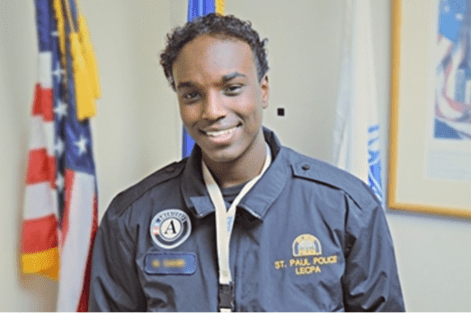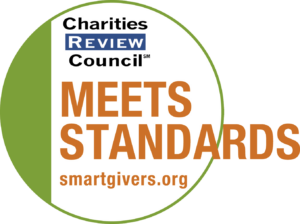Mahamed Dahir remembers how St. Paul police officers would open the neighborhood gym to play basketball with him and his friends when he was a teenager.
The image stuck with him as he got older and inspired him to begin training to be the kind of police officer who would engage with young people across the city. As an AmeriCorps member in the Law Enforcement Career Path Academy (LECPA) at the St. Paul Police Department, he is now on a fast-track to achieving that dream.
The LECPA program is for AmeriCorps members who are considering a career in law enforcement. Members do community outreach and community relations service for the police department while working on their college degree. Mahamed, who is enrolled at Inver Grove Heights Community College, joined the LECPA program in March 2018, but his interest in becoming a police officer started several years ago.
“I wanted to get my foot in the door any way possible, but I just didn’t know how,” said the lifelong St. Paul resident and Central High School grad. Fortunately, when he was working out at a boxing gym on the East side of St. Paul, he met a LECPA program member who encouraged Mahamed to apply.
Learning Not to Fear Police
Mahamed said that when he was a child, he didn’t have a positive view of law enforcement – only fear.
“My mom, who is Somali, would be driving, and she would panic if there was a police officer driving behind her. She’d be stiff and keeping her hands straight on the wheel. It was a fearful thing and never a positive thing,” he said. “So I didn’t consider becoming a police officer at all when I was a kid.”
However, his family moved to the McKnight neighborhood in lower East St. Paul when he was a young teen, and his interactions with police officers there changed his outlook.
“It was out of the norm for us to play outside in the winter – especially Somali kids. A lot of our parents try to avoid driving in the winter because they are not very comfortable with that, so winter time can be a very boring time for Somali kids – it’s just school and home,” Mahamed explained. “So on Tuesdays, the police officers started opening the gym and would play basketball with us.”
In the summer, the police officers continued the outreach by taking him and other kids from the neighborhood on fishing trips and bike rides – “something we wouldn’t have the opportunity to do every day,” he said.
The following year, the department formed a partnership with the mosque that Mahamed’s family attended and established a “Junior Police Academy.” Officers would pick up interested kids from Islamic school every Sunday for a month and show them aspects of police work.
“It was very fun and all of us loved going there,” he said. “We learned about the K9 unit, the SWAT team and the bomb squad, and we learned how to handcuff people and do the police work-outs.”
More importantly, the experience showed Mahamed a different side of what it meant to be a police officer.
“I realized these guys really care and their engagement with us inspired me to think, ‘I want to do something like this. I want to be that role model and mentor to the youth as a police officer. I want to change the perspectives of the community,’” he said. “It wasn’t until I saw that engagement with the community myself that I saw police as a positive thing, and now I want to do that for others.”
How He Serves
After Mahamed graduated from Junior Police Academy at 15, he was determined to work toward the goal of becoming a police officer. He signed up for a police explorer program, and in his junior year of high school, he signed up for military service in the Minnesota National Guard, which he felt would teach him important skills and he continues.
His AmeriCorps service in the police department involves primarily community engagement and outreach.
“Basically, what the police officers did for me when I was younger, I’m doing for them now,” he said. “I have a strong relationship with the kids at McDonough and Hazel Park. They come to me with their problems and also just to talk and play with them. It’s a very good feeling.”
Mahamed said he also enjoys service with a Latino parent group that speaks little English. He said they practice English with him and he practices Spanish with them, and they have established friendships that transcend language. More importantly, they trust that they can call the police if they need to.
“A lot of people who are undocumented immigrants won’t call the police when they are victimized, and that’s not right,” Mahamed said. “They are now informed that no matter what, if you’re a victim of a crime, you can call the police department and none of that will be asked of you – your immigration status or past criminal history. When you’re a victim, you’re a victim.”
One of his favorite aspects of service, however, is working with the homeless – visiting them in shelters or handing out supplies at homeless encampments and listening to their stories.
“When you think about the homeless, there are stereotypes you keep in your head, but when you hear their stories, it changes your perspective,” he said. “When I’m on the job someday and get a call about a homeless person, I will respond to that call in a different way now that I’ve had experience talking with homeless people.”
A Future in the St. Paul Police Department
Although his family supports his AmeriCorps LECPA service, Mahamed’s mother was first concerned about his safety, but he said she’s come around.
“When my mom saw that I was super-passionate about law enforcement, she started to feel differently about it. My mom now says, ‘I feel like this is for you, and I’m happy for you,’ but she is still afraid that I might have to be in a very dangerous situation someday,” he said. “Still, she knows that I can take care of myself.”
He believes the LECPA program, now in its second year at the St. Paul Police Department, is already making a difference not only in the communities in which he serves but also the department itself.
After completion of LECPA and the follow-up AmeriCorps program, St. Paul Police Department Leader Corps, Mahamed hopes to go to Police Academy and then become a police officer in St. Paul.
“Why work in a city other than one that I was raised in? People that raised me are my mother, and also the rec centers and the libraries here, and I just want to give back to my community,” he said. My goal is as a police officer, I want to be a mentor and a role model to the youth, and a friend to the residents of St. Paul.” —Shayla Thiel Stern
For more information about the Law Enforcement Career Path Academy program, visit this page.





